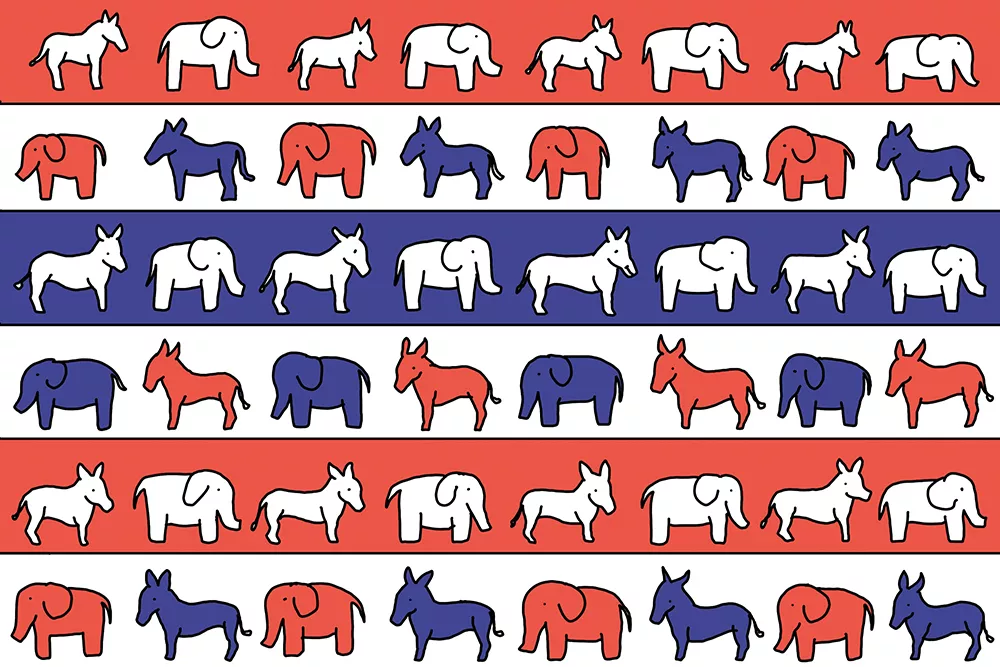Some things in politics, we're told, are like gravity. They're unchangeable truths, for better or worse. This kind of thinking can blind us to dangers. For example, believing that the United States is an unbreakable democracy can stop us from defending our institutions due to certainty they will stand. Alternatively, such thinking can hide from us new possibilities that might allow us to fly beyond the limits of our current politics.
One such unbreakable rule is that the speaker of the house will be elected by a majority of his or her own party in a closed-caucus meeting and then everyone will fall in line to elect that speaker on the floor. Over the years, that proposition has been challenged by a few rogue members casting dissenting votes against their party's pick, but it has stood as the norm.
Now, No Labels, an advocacy group that aims to pull elected officials together across party lines to address our nation's biggest challenges, is proposing a radical new approach to electing the speaker.
No Labels suggests that members of both parties together should select the speaker, ultimately resulting in a bipartisan pick. The result would be a House that was governed not to suit a majority of the members of the majority party (the so-called Hastert Rule), but an actual straight-up majority of the House.
It's an audacious idea. Either party may hold a slim majority after this year's midterm elections, but it's hard to imagine rank-and-file Democrats or Republicans being willing to betray the majority of their party's pick for speaker in favor of a consensus selection with their opponents across the aisle. But then, the unimaginable has happened before in the U.S. House.
In 1910, Republican George Norris was a relatively new representative from Nebraska and he, too, had an audacious idea. As John F. Kennedy wrote about in Profiles in Courage, Speaker of the House Joe Cannon had consolidated tremendous power.
Consequently, standing up to Cannon seemed political suicide, but that's exactly what Norris did. And shockingly, he won. A majority of Norris' colleagues joined him in voting for reforms that removed Cannon from the Rules Committee and increased the autonomy of all committee chairs.
Norris remained independent and brave or reckless (depending on your point of view) throughout his political career. He filibustered President Woodrow Wilson's initial efforts to join World War I and endorsed a Democratic candidate for president over his own party's nominee, Herbert Hoover.
But perhaps, most relevant to the current reform proposed by No Labels, was Norris' efforts just before and after he left the U.S. Senate.
Norris proposed perhaps the boldest reform to the structure of the government since Emancipation. He offered a citizen initiative in Nebraska to shift from a two-house legislative branch to a single, nonpartisan body, where senators would be elected without a party label and the entire body would elect a speaker, as well as each committee chair. Nebraskans embraced the reform in a vote of 286,086 in favor to 193,152 against. (Norris went on a roadshow, trying to sell other states on the idea, but ultimately found no takers.)
The Nebraskan system has worked well, regularly electing a selection of bipartisan committee chairs and pragmatic centrist speakers.
Key to preserving the system in Nebraska has been electing the speaker and committee chairs by a secret ballot. This protects legislators from partisan attacks from the far right or left for supporting consensus candidates.
Of course, as I noted earlier, this all seems an extraordinary long shot in today's political climate. How could either party reasonably be expected to share power with their adversaries in our increasingly divided nation?
Here's the thing: Whichever party fails to be the majority after this year's midterms would have every incentive in the world to vote for a new system that gave them a voice in selecting the speaker. Assuming a vast majority of votes from that minority for a rule change, all that would be required is a renegade group of moderates from the majority proposing the change.
Ultimately reform rests not in hoping for a broad set of lawmakers willing to buck the system but a small group willing to offer a modern set of profiles in courage. ♦


















